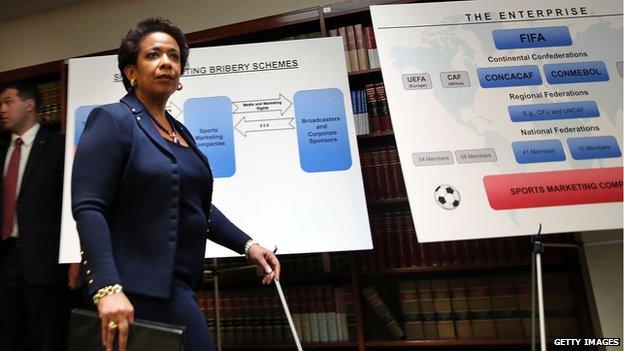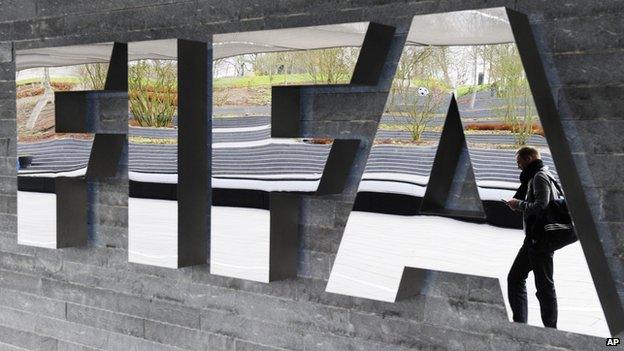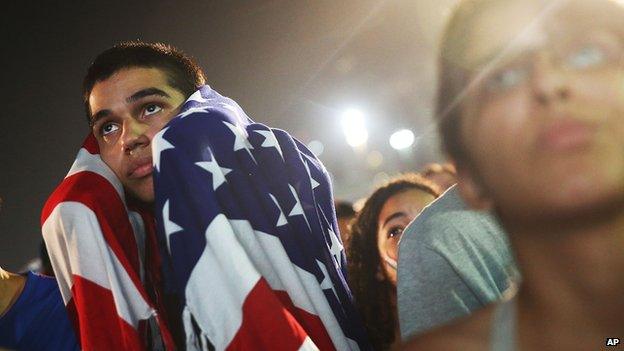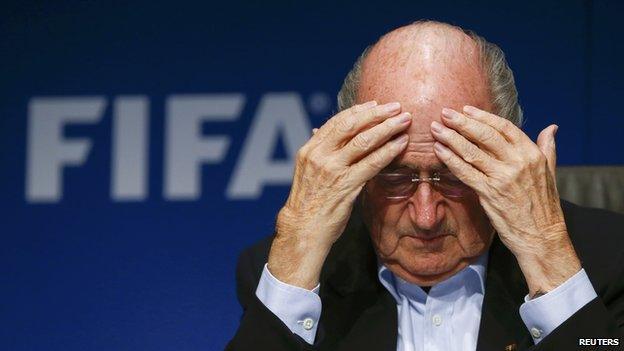Fifa scandal: Is the long arm of US law now overreaching?
- Published
- comments

No stadium... yet
It is probably premature to start talking about Wembley being rebranded as the Loretta E Lynch stadium - with perhaps a James Comey stand, named after the FBI chief - but surely it's on the cards.
After all has anyone delighted English soccer fans more than the US Attorney General and the FBI head?
There was almost a visceral thrill and delight among those who have come to loathe and detest FIFA, that finally someone was taking it on.
The world's most powerful law enforcement agency versus the seemingly untouchable and omnipotent world sports body. That's a match up that any fan would pay top dollar to watch. At last, Fifa would get its comeuppance.
We still have no definitive answer to the question - what changed Sepp Blatter's mind between winning re-election on Friday and standing down on Tuesday?
But it's pretty clear what the evidence points to. Was it the brilliant journalism from both the Sunday Times and the BBC that had made him blink? Sadly, no.

Was it the threat of the sponsors pulling out their cash? Well I read all the statements from the various global corporations as they were released last week - and frankly, they had all the resolve of a sweaty, clammy, limp handshake. "We believe in integrity and hope Fifa will act in alignment with our core values." Oh how they must have quaked and quivered at Fifa HQ when they read those pusillanimous missives.
What about the threat of a boycott of the next World Cup from the UEFA nations? Really - are you kidding me? Was that ever going to happen? No. So if you discount those, that means the only credible explanation is the FBI investigation - arrests had been made, the investigation was going to be widened - and under that sort of relentless pressure, Blatter folded.
There is a great little vignette in the Chuck Blazer court papers. He is the ex-Fifa executive committee member who has pleaded guilty to corruption and cut a deal with the FBI to carry a wiretap to implicate others. At one point in the hearing there is a discussion in court about how to pronounce "Fifa".
It is an organisation of which there is scant knowledge in the US. This is a story that across Europe and much of the rest of the world is leading the news every night. In the US it is not even in the television headlines - despite the whole process being driven by the FBI.
And that is important. It would be lovely to think that in the separation of powers that is one of the distinguishing features of liberal democracies, the judicial system operates entirely independently of the executive. But does it? Remember the start of Charles Dickens' Bleak House - with the thick impenetrable fog enveloping everything: "And hard by Temple Bar, in Lincoln's Inn Hall, at the very heart of the fog, sits the Lord High Chancellor in his High Court of Chancery."

US fans can cheer their prosecutors as well as their team
There is always a murky political consideration of what gets investigated and how. Just take the phone hacking investigation in the UK. In one political climate the prosecuting authorities decided not to go after one of the world's most powerful media organisations - and then a few years later did. The laws hadn't changed, just a change in the desire to implement them. If the FBI had uncovered corruption, say, at the National Basketball Association in the US there would have been all manner of political considerations to weigh. Who were the key figures, what were their political connections, who else might get caught up in the inquiry, is every duck lined up in a row.
I suspect with this inquiry there were NO political considerations. Virtually everyone is foreign, so we can go for it with gusto. No holds barred.
So three cheers for the FBI, its very long reach and US justice? Well, up to a point. That was how I felt last week. But there's another side to this, perhaps in my mind sparked by the news on Wednesday that the FBI's investigation has widened to include the award of the 2018 and 2022 World Cups to Russia and Qatar.
Some of the charges relate to alleged crimes in the US, but there are massive implications to what my legal friends would call ETJ - Extraterritorial Jurisdiction. I'm not a lawyer but it seems to me to be the right of the US to poke its nose into anyone's affairs anywhere in the world. So let's take a hypothetical British company that has a business arm in America, it is then subject to the terms of the US Foreign Corrupt Practices Act. And let's say this British company in London pays a sweetener to some company in Bulgaria to get a factory opened in Sofia - it has broken US law and the FBI can come knocking at the door.

Blatter quit, eventually
Take the case of BNP Paribas, the biggest of the French banks. Last year it was fined $8.9bn by the US justice department for breaching American sanctions against Sudan, Iran and Cuba. Yes, American sanctions (there are no French sanctions). The fine was so great, and the penalties so damaging that President Hollande pleaded with President Obama directly to intervene. I know the banks are hardly cause celebres for the downtrodden and exploited - but why isn't this a matter for the French judicial authorities, and the French authorities alone? There are many other examples.
Barack Obama's presidency has been marked by his determination to pull US troops out of foreign conflicts, to admit past mistakes and to say it is not for us to pick and choose which world leaders we like. But is America creating a new legal imperialism?
Let us just imagine for a minute that instead of Qatar having won the 2022 bid, it had been the US. How would America respond if Russia announced it was to investigate how the World Cup was awarded to the US?
Maybe old Vladimir Putin had a point when he said after the FIFA arrests last week - what business is this of America?